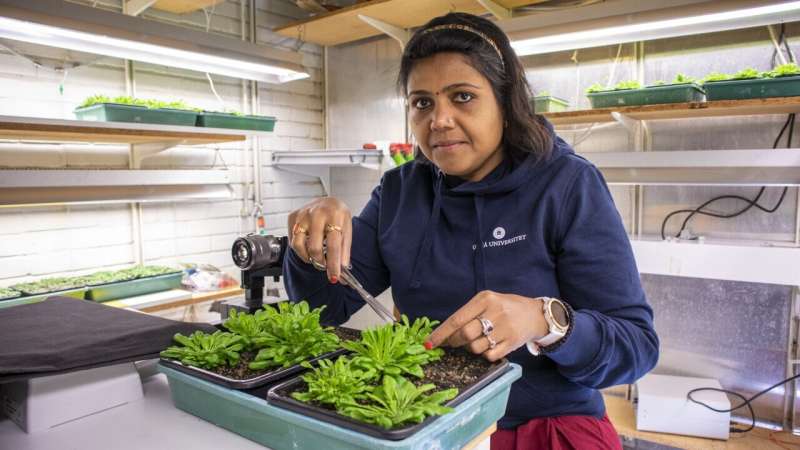Laxmi Mishra has used weed Arabidopsis thaliana as model organism in her research about proteases. Credit: Anna-Lena Lindskog, Umea University
Climate change with its extreme temperatures and fluctuating precipitations is affecting agricultural land conditions and crop yields. Therefore it is essential to understand and improve the details of plant growth. Laxmi Mishra has developed new knowledge about a family of chloroplast proteases called FtsH. She is defending her dissertation at Umeå University.
Proteases are proteins that degrade other proteins; they either clean the cell from malfunctioning enzymes, activate them or generate signals. Hence its the inevitable fate of a protein to meet a protease in its lifetime.
"While the importance of proteases for cell survival and for various diseases is well known, my work deals with inactivated proteases (pseudo-proteases), which therefore could be seen as 'anti-heros,'" Laxmi says.
Laxmi Mishra's work focuses on a family of proteases called FtsH, which are present in human, animals, plants and bacteria. She is using the annual weed Arabidopsis thaliana as model organism. Plants do not only contain active FtsH proteases, but even some with mutations rendering them proteolytically inactive (termed FtsHis; i for inactive).
"Even though these enzymes are not functioning as proteases, we found them to be extremely important for the survival of plants," says Laxmi.
Laxmi Mishra used molecular biological, biochemical and physiological methods to reveal the role of these inactive FtsH pseudo-proteases. She compared wild-type Arabidopsis thaliana plants with mutants depleted in single FtsHi proteins and exposed these plants to various stresses in controlled laboratory conditions, but even outside in the field.
Interestingly, Laxmi found that absence of one of the Ftshi enzyme improves drought tolerance in Arabidopsis thaliana. In a collaborative study carried out partly at UC Berekely/USDA in Prof Devin Coleman-Derr lab, she showed that the mutant plants sense the drought stress, but do not act according to it.
More information: FtsH metalloproteases and their pseudo-proteases in the chloroplast envelope of Arabidopsis thaliana. umu.diva-portal.org/smash/record.jsf?pid=diva2%3A1592528&dswid=-5051
Provided by Umea University
























